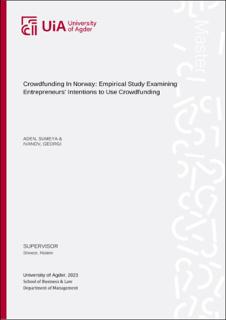Crowdfunding In Norway: Empirical Study Examining Entrepreneurs' Intentions to Use Crowdfunding
Master thesis
Permanent lenke
https://hdl.handle.net/11250/3079829Utgivelsesdato
2023Metadata
Vis full innførselSamlinger
Sammendrag
This master's thesis investigates the drivers and inhibitors influencing the intention of entrepreneurs to use crowdfunding as a financing method, with a focus on the potential distinctions between native and immigrant entrepreneurs in Norway. Crowdfunding has emerged as an inclusive alternative source of finance, enabling individuals and businesses to overcome traditional funding limitations. Immigrant entrepreneurs, in particular, face unique challenges when seeking financial capital from conventional sources. However, research exploring the intention to adopt crowdfunding by entrepreneurs is limited.
Using an empirical analysis based on online survey data from 231 entrepreneurs in Norway, this study aims to bridge the research gap by identifying the factors shaping entrepreneurs' intentions to use crowdfunding. The study reveals that there are three key drivers positively impacting the intention to use crowdfunding by entrepreneurs in Norway: (1) being an immigrant, (2) perceived trust in the crowdfunding platform, and (3) the perceived usefulness of crowdfunding for their business venture. On the other hand, immigrant entrepreneurs demonstrated a higher intention to use crowdfunding, while native Norwegian entrepreneurs exhibited greater trust in the platform, stronger social capital within Norway, and increased access to financing through public grants and private investors.
The thesis begins with a literature review of existing research on crowdfunding, focusing on entrepreneurs' motivations. Subsequently, 13 hypotheses were presented and tested using the quantitative research method. The thesis concludes by summarizing key contributions, acknowledging limitations, and providing insights for further research and implications for crowdfunding platforms and entrepreneurs in Norway.
